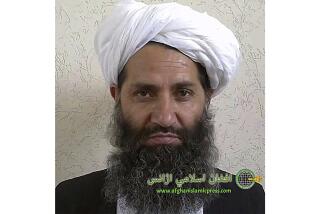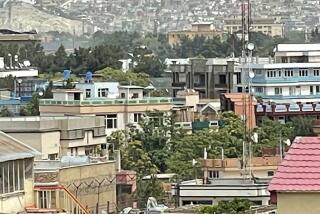Afghanistan president’s remarks again stir unease
- Share via
Reporting from Kabul, Afghanistan, and Washington — President Hamid Karzai’s latest anti-Western outburst has triggered unease and dismay among Afghan lawmakers and some in the diplomatic community in Afghanistan.
On Saturday, the Afghan leader told members of parliament that Western meddling in Afghan political affairs was helping the Taliban movement, because it fueled a public perception that the insurgency is a legitimate struggle against foreign occupation.
Karzai then added -- apparently speaking rhetorically, according to several lawmakers who were present at the closed-door talks -- that if that were the case, he would join the Taliban himself.
On Monday, White House Press Secretary Robert Gibbs said the accusation of U.S. meddling was “genuinely troubling” and “obviously not true.” Gibbs said he didn’t think the remarks should jeopardize Afghan war funding.
“What our military is doing there is in order to stamp out extremism and to ensure that the Taliban and its extremist allies are incapable of coming back to Afghanistan and setting up a safe haven by which to plan further attacks on the United States,” he said. “Preventing that from happening is strongly in our national interest.”
Gibbs said a meeting scheduled for May 12 between Karzai and President Obama was still on.
Karzai’s comments over the weekend marked the second time in recent days that the Afghan president had accused the West of undue interference in domestic political affairs. Last Thursday, he told election officials that foreigners, not Afghans, were responsible for massive fraud in last summer’s botched presidential election.
Much of that fraud was attributed to the Karzai camp, and an auditing panel stripped the president of about a million votes, nearly a third of those cast for him. He ultimately was declared the winner after his main opponent dropped out of the race, which forced the scrapping of a second-round vote, but his stature was considerably eroded by the months-long controversy.
Karzai is embroiled in a battle of wills with parliament over a decree giving him sole authority to appoint members of the election oversight panel. Parliament’s lower house had voted to overrule the decree, but its upper house backed Karzai.
Two Western diplomats in Kabul described accounts of Saturday’s meeting with lawmakers as surprising, because Karzai’s incendiary comments along the same lines on Thursday had prompted Secretary of State Hillary Rodham Clinton to express concern and seek clarification. His aides later said those comments had been misconstrued.
Nonetheless, Saturday’s language was strikingly similar to what Karzai had used two days earlier, lawmakers said.
Some parliamentarians present at Saturday’s meeting warned against taking Karzai’s threat literally.
“He didn’t really mean that he’s going to join the Taliban. He was saying there are a lot of problems and pressures on him,” said Daoud Kalakani, a member of parliament’s international affairs committee, who was at the meeting.
But he said he and others warned Karzai that he was damaging his reputation with Afghanistan’s Western backers, who have sent tens of thousands of troops to fight the Taliban, together with billions of dollars in aid.
“We told him, ‘That kind of talk is not to our benefit,’ ” Kalakani said. “He said: ‘Don’t worry about it. I am going to talk with the foreigners and resolve this issue.’ ”
The next day, accompanied to Kandahar by U.S. and British officials, Karzai referred to the West as a partner, but also told tribal elders and community leaders that a planned military offensive in that area would not take place without their backing.
Karzai aides did not return phone calls Sunday or Monday seeking comment on his latest remarks.
cparsons @tribune.com
More to Read
Sign up for Essential California
The most important California stories and recommendations in your inbox every morning.
You may occasionally receive promotional content from the Los Angeles Times.











